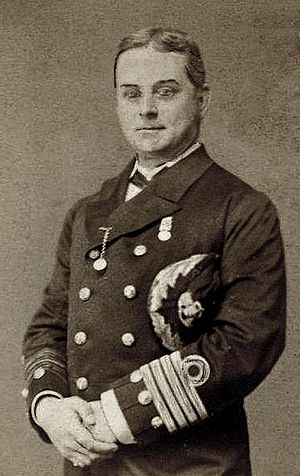Pelham Aldrich facts for kids
Quick facts for kids
Pelham Aldrich
|
|
|---|---|

Pelham Aldrich
(1884) |
|
| Born | 8 December 1844 Mildenhall, Suffolk |
| Died | 12 November 1930 (aged 85) Great Bealings, Suffolk |
| Place of burial |
Great Bealings, Suffolk
|
| Allegiance | |
| Service/ |
|
| Years of service | 1859 - 1908 |
| Rank | Admiral |
| Commands held | HMS Sylvia HMS Fawn HMS Egeria |
| Awards | Royal Victorian Order |
Admiral Pelham Aldrich (born December 8, 1844 – died November 12, 1930) was a brave officer in the Royal Navy. He was also a famous explorer. Later in his career, he became the Admiral Superintendent of the important Portsmouth Dockyard.
Contents
Pelham Aldrich was born in Mildenhall, a town in Suffolk, England. His parents were Dr. Pelham Aldrich and Elizabeth Frances Aldrich. In 1875, he married Edith Caroline Issacson.
He joined the Royal Navy as a young cadet in June 1859. This was the start of a long and exciting career at sea. He quickly moved up the ranks, becoming a sub-lieutenant in 1864 and a lieutenant in 1866. He served on several ships, including the Scout and the large ironclad ship Lord Warden.
Exploring the Oceans: The Challenger Expedition
One of Aldrich's most important adventures began in 1872. He joined the crew of Challenger for the famous Challenger expedition. This was a huge scientific journey that lasted four years, from 1872 to 1876.
The expedition explored the world's oceans, making many new discoveries. It helped create the science of oceanography, which is the study of the oceans.
Arctic Adventures: Reaching the North
In 1875, Aldrich transferred to the ship Alert. He joined the British Arctic Expedition. This expedition had a daring goal: to try and reach the North Pole by sailing through Smith Sound.
Aldrich led a special team called the Western Sledge Party. They explored Ellesmere Island in the Arctic. A place often called the most northerly point in North America is named Cape Aldrich in his honor. This shows how important his explorations were.
Surveying the World: Mapping Coasts
After his Arctic adventures, Aldrich was promoted to commander in 1876. He then took command of the ships Sylvia and Fawn. His new job was to lead surveying expeditions. This meant carefully mapping coastlines in places like China and the Mediterranean Sea.
While he was captain of the Fawn, he also helped observe a rare event. In 1882, he and scientist Stephen Joseph Perry watched the transit of Venus from Madagascar. This is when the planet Venus passes directly in front of the Sun.
In 1883, he became a captain. He continued his surveying work on the Sylvia and Egeria. He mapped areas around the Cape of Good Hope and Australia.
Honors and Later Career
In 1888, the Egeria visited Christmas Island. On board was Charles Wyville Thomson, a chief scientist from the Challenger Expedition. He named a sea creature called a crinoid Bathycrinus aldrichianus after Aldrich. Years later, in 1978, Christmas Island even issued a stamp in his honor!
Another honor came from the famous explorer Robert Falcon Scott. Scott named Mount Aldrich in Antarctica after Pelham Aldrich. This was to thank him for his help in preparing for Scott's own expeditions.
Aldrich continued to rise through the ranks. He became a rear-admiral in 1898. From 1899 to 1902, he served as the admiral superintendent of Portsmouth Dockyard. This was a very important job, overseeing a major naval base. King Edward VII recognized his service by making him a Commander of the Royal Victorian Order (CVO) in 1902. He was promoted to vice-admiral in 1903 and finally to full admiral in 1907.
Retirement and Legacy
Admiral Pelham Aldrich retired from the Navy in 1908. He moved to a place called The Croft in Great Bealings, Suffolk. He passed away in Great Bealings in 1930 and was buried in the local churchyard.
Pelham Aldrich is remembered as a dedicated naval officer and a significant explorer. His work helped map parts of the world and contributed to our understanding of the oceans.
Images for kids
 | Mary Eliza Mahoney |
 | Susie King Taylor |
 | Ida Gray |
 | Eliza Ann Grier |


